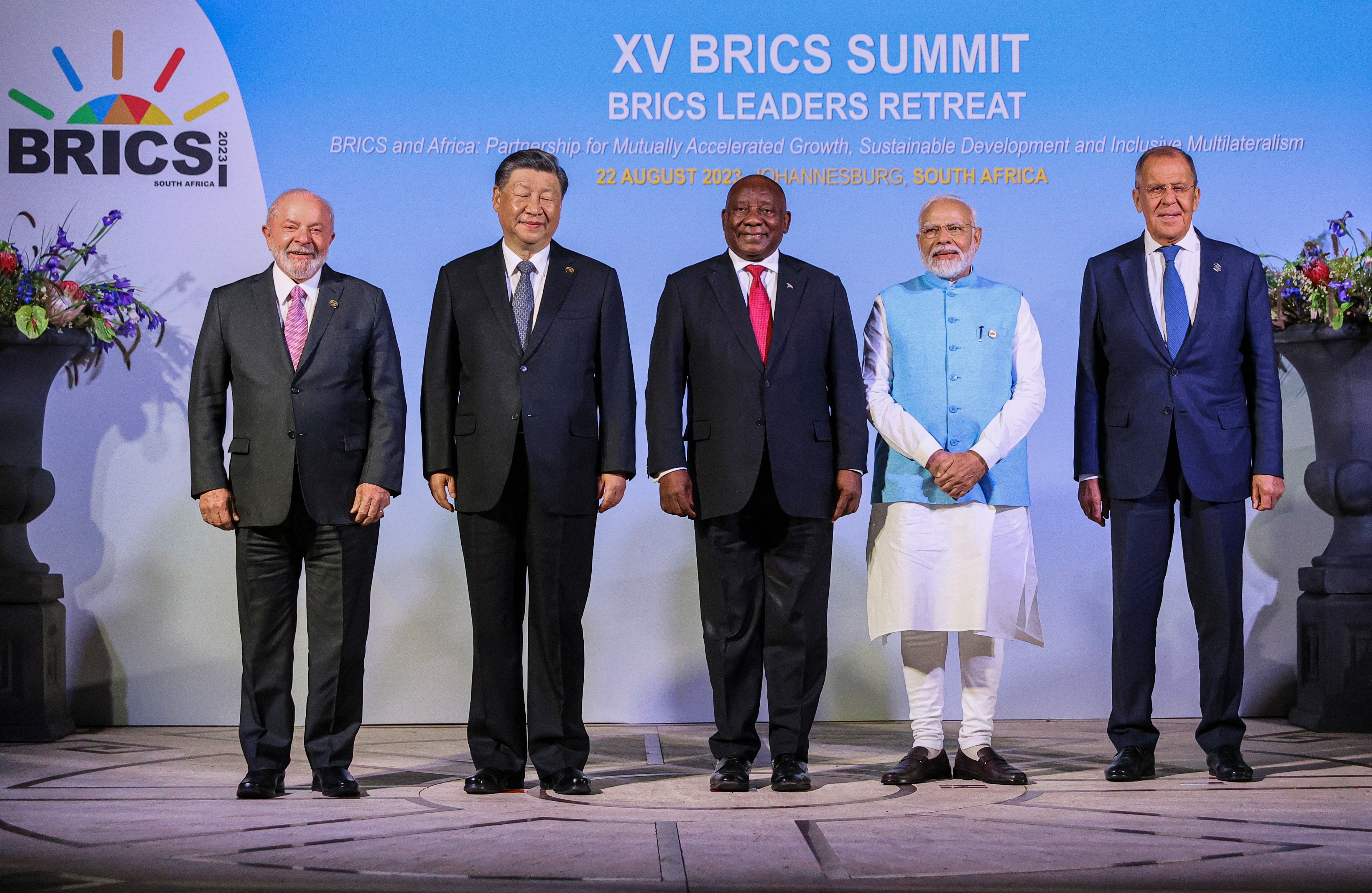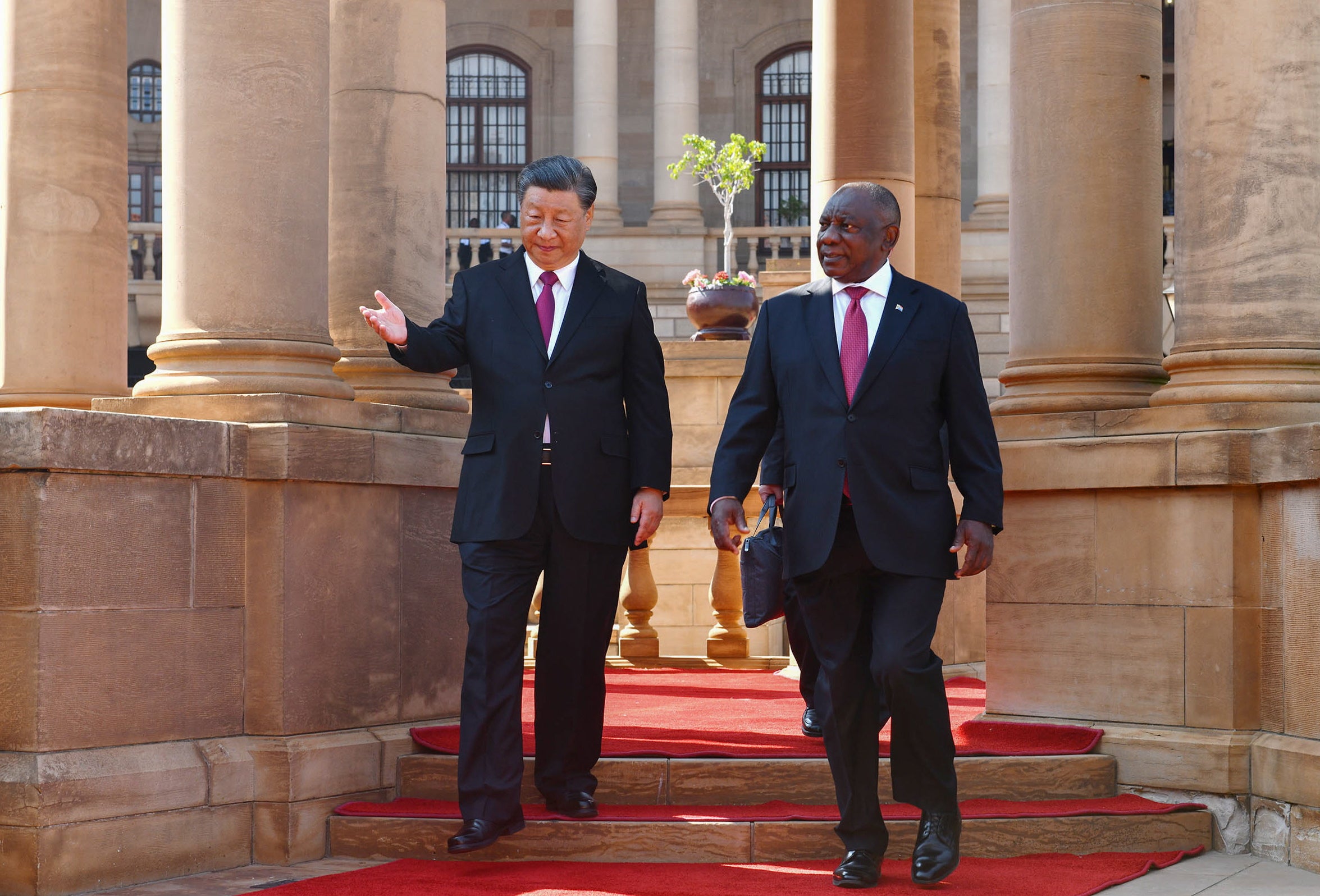Xi Jinping fails to deliver speech at Brics summit addressed by Putin, Modi and other leaders
China analysts taken aback by Xi’s sudden decision to not give the planned speech

China’s president Xi Jinping surprisingly withdrew from addressing the Brics Summit in South Africa where world leaders of the economic bloc gave their own speeches on Tuesday.
Mr Xi reached Johannesburg on Monday to attend the key multilateral business forum and was scheduled to deliver his speech alongside the leaders of India, Brazil, South Africa and Russia’s president Vladimir Putin, who addressed the summit virtually.
The Chinese president was arranged to be seated next to Indian prime minister Narendra Modi, but instead, Chinese commerce minister Wang Wentao took his place after greeting delegates.
Mr Xi’s unexpected move at the forum has sparked rumours with several China analysts trying to understand the reason behind the last-minute change in arrangement.
No reason was presented by the Chinese side for Mr Xi missing the speech. Mr Wang ultimately addressed the forum.
Mr Xi is said to have met South African president Cyril Ramaphosa earlier that day and later went to the summit dinner with the leaders of South Africa, Brazil and India, as well as Russia’s foreign minister.
China observers noted the “unusual” peculiarity.
“Something seems off,” said Bill Bishop, the author of Sinocism, a popular newsletter about Chinese affairs.
The China Global South Project, that covers China’s engagement with Africa, said on X, formerly Twitter, that calling the move “extraordinary will be an understatement” as the Chinese leader never misses highly choreographed events like these.

“A very unusual first day for the Chinese delegation at the BRICS summit in South Africa after President Xi Jinping did not show up for a scheduled speech at the BRICS Business Forum,” said the non-profit multimedia organisation.
“This is the second mysterious Chinese absence from a BRICS event this year. Before he was replaced, Qin Gang also inexplicably failed to appear at last month’s foreign ministers meeting in Cape Town,” it said, referring to the former Chinese foreign minister who was recently replaced.
Bonnie Glaser, the managing director of the German Marshall Fund’s Indo-Pacific Program, also called it “extremely unusual” for the Chinese leader to miss the speech as Beijing remains hugely invested in Brics.
It appeared to be a last-minute change after several Chinese news outlets and even Chinese foreign ministry top spokesperson Hua Chunying referred to Mr Wang’s remarks as if they were delivered by Mr Xi.

The summit taking place in 22-24 August holds even more importance for Beijing as the grouping seeks to counter-weigh Western dominance of global institutions, including blocs like the G7.
One of the main agendas of the Brics summit this year is the expansion of the bloc with hopes that broader membership will lend clout to the grouping that already boasts of representing about 40 per cent of the world’s population and a quarter of the global gross domestic product.
This realisation was not lost on China, which said the future will be shaped by the choices the grouping makes today.
“Right now, changes in the world, in our times, and in history are unfolding in ways like never before, bringing human society to a critical juncture,” Mr Wang said.
“The course of history will be shaped by the choices we make.”
He attacked the US without naming it and referred to it as “obsessed with maintaining hegemony, [and] has gone out of its way to cripple the emerging markets and developing countries”.
“Whoever develops first becomes their target of containment. Whoever is catching up becomes its target of obstruction,” he said.
All Brics members, however, are not on the same page as China.
India, a steadfast US ally that shares strained relations with its neighbour, is hesitant of empowering Beijing through the bloc.
India warned against rushing expansion and said it has “positive intent and an open mind”, according to its foreign secretary Vinay Kwatra.
Brazil’s president, Luiz Inácio Lula da Silva, acknowledged that the motive is not to compete with Western institutions.



Join our commenting forum
Join thought-provoking conversations, follow other Independent readers and see their replies
Comments